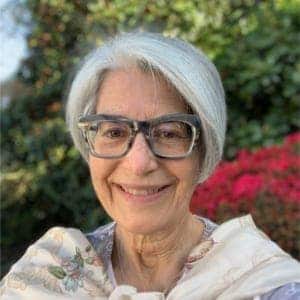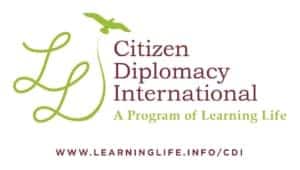Three Years of Citizen Diplomacy in Four Parts
by Debbie Trent, CDI Vice Chair
 While the Covid-19 virus covered the globe and isolated so many of us, the Citizen Diplomacy Research Group – now Citizen Diplomacy International (CDI) – emerged as a new community for connecting analysts, volunteers, practitioners and students. Our Zoom platform has opened up more space for networking and collaboration. It’s also provided opportunities for social connection among thoughtful people with mutual interests. Thanks for visiting this page for my reflections on our CD community’s shared experience during the pandemic and several personal transitions.
While the Covid-19 virus covered the globe and isolated so many of us, the Citizen Diplomacy Research Group – now Citizen Diplomacy International (CDI) – emerged as a new community for connecting analysts, volunteers, practitioners and students. Our Zoom platform has opened up more space for networking and collaboration. It’s also provided opportunities for social connection among thoughtful people with mutual interests. Thanks for visiting this page for my reflections on our CD community’s shared experience during the pandemic and several personal transitions.
Celebration
CDI is celebrating Birthday #3. As I’ll soon step away from the CDI vice chair role, here’s kudos to all who have participated to make this community thrive.
Since our launch meeting on June 23, 2020, the member listserv has expanded ten times, to more than 1,200 people in 108+ countries across the globe. Each Zoom meeting draws at least two expert CD presenters and 20-40 international attendees. They include scholars, practitioners, students and volunteers. CDI Chair Paul Lachelier coordinates an extensive collection of resources – and an able cadre of student interns – including the presentations, Zoom chat discussion, screenshots and video recordings of each meeting, the bi-monthly Citizen Diplomacy Bulletin and the CDI Bibliography of literature, experts, practitioners, and organizations. All are accessible in this share drive to CDI email list members.
Here’s the “honor roll” of our researchers and practitioners and their wide-ranging presentations, with their respective presentation focus indicated in brackets [ ]:
2020
August 25: Robert Kelley, “Citizen Diplomacy Definitions, Landscape, and Trends” [Global.] Hayley Pottle, “TechGirls: Brief History, Purpose, Program, and Benefits” [Global].
October 28: Nikki Hinshaw, “A Case Study of Sister Cities International” [USA]. Andreas Fulda, “The Emergence of Citizen Diplomacy in European Union–China Relations” [Europe, China].
December 1: Mohsen Amin, “The Arbaeen (annual pilgrimage) as Religious Diplomacy” [Middle East]. Jacob Schouenborg, “Grassroots Sport Diplomacy” [Global].
2021
February 3: Giles Scott-Smith, “The Network for New Diplomatic History” [Global.] Linda Staheli,“Global Co Lab Network: Engaging the Next Generation” [Global].
April 6: Julie Moyes, “Soft Power & Citizen Diplomacy” [USA]. James Ketterer, “Jazz Diplomacy” [USA].
June 8: Tenille Archie & Rossella Vulcano, “Intercultural Communication” [Global]. Stefan Cibian, “A Framework for Community Diplomacy” [Romania].
August 4: Special Panel Discussion on “The Consequences of Covid for Citizen Diplomacy.” Elizabeth (Libby) Lyons, on a post-pandemic action plan for U.S and other environmental scientists [Global]. Kelsey Edmonds, on digital communication and relations in sister city partnerships [USA]. Siobhan Lyons on leading Citizen Diplomacy International Philadelphia [USA]. Kadir Jun Ayhan on South Korean public and citizen diplomacy [S. Korea].
October 5: Dana Vanderburgh, Violeta Martinez & Michael Woma, on dance diplomacy [USA, Panama, Ghana].
December 8: Katherine Brown, “Global Ties US at 60″ [USA]. Paul Lachelier, “Family Diplomacy for a More Caring World” [Global].
2022
February 9: Anna Popkova, “Exploring Citizen Diplomacy’s Local Impact: The Case of Global Ties Kalamazoo” [USA]. Nicholas Cull, “Information Disarmament: Citizens and the Forgotten Dimension of the 1980s US-Soviet Rapprochement” [USSR & Russia].
April 5: Patricia Harrison and Dianne Neville, “’Post-Pandemic’ Innovations in Exchange: The (World Learning) Professional Fellows Program as a Case Study” [USA]. Jean-Christophe Boucher, “Ukrainian Diaspora Mobilization during the Crimean Crisis” [Global].
June 8: Jay Wang, “Public Diplomacy in Your Neighborhood” [Global]. Anand Torrents & Rosa Torrademé, “Introduction to the Foundation for Democracy & Citizenship” [Spain].
August 9: Book launch by Lior Lehrs, Unofficial Peace Diplomacy: Private Peace Entrepreneurs in Conflict Resolution Processes [Israel, Palestine]. Anca Anton and Raluca Moise, “The Citizen Diplomats and Their Pathway to Diplomatic Power” [Global].
October 12: John Marks, “Track II Diplomacy between Iran and the US” [Iran, USA]. Reina Neufeldt, “Research as Practice: Lessons for Citizen Diplomacy from a Canadian-Haitian Peacebuilding Partnership” [Canada, Haiti].
December 6: Carson Tavenner, “Subnational Citizen Diplomacy Leadership” [Global]. Laurie Mulvey, on the World in Conversation Center for Public Diplomacy at Pennsylvania State University [Global].
 2023 (transition to CDI and quarterly meetings)
2023 (transition to CDI and quarterly meetings)
March 8: Vijay Kumar Chattu, “Strengthening Global Health Security through Global Health Diplomacy” [Global]. Sali Hafez, “Health Diplomacy in Conflict and Post-Conflict Contexts: Lessons from Iraq, Syria and Yemen” [Iraq, Syria, Yemen].
June 6: Sohaela Amiri & Efe Sevin on their edited volume, City Diplomacy: Current Trends and Future Prospects [Global]. Dan Peterson and Betsy Bell on the historic Seattle-Tashkent Sister Cities relationship [USA, Uzbekistan].
We’ve hosted many global presentation topics and speakers from most world regions, and the remaining CDI meetings in 2023 promise to further enrich that diversity:
September 6: Presenters TBA, on democratizing and localizing world affairs.
December 5: Presenters TBA, on digital diplomacy.
Here’s a round of virtual applause to the 38 researchers and practitioners with whom we’ve had the benefit to engage so far!
Change
Involvement in the CDRG/CDI community, and hearing the stories of practitioners and scholars has been personally and professionally motivating. It’s been a career-long goal of mine to support a trans-sectarian, transnational, public-private partnership to promote mutual understanding, peacebuilding and sustainable socioeconomic reform in Lebanon, my heritage country. The August 4, 2020 chemical explosion at the Port of Beirut catapulted me into action. I contacted a cousin with extensive development experience in the Middle East, and this past March 10th – along with more cousins, pioneering fuel cell experts, and investors – we incorporated the U.S. nonprofit. Illumi-Nation Global, Inc.
Illumi-Nation Global will raise funds to undertake a sustainable decarbonization program in Lebanon and hopefully beyond. The “Phoenix Initiative” will produce and distribute solar-powered electricity, liquid bio-ethanol fuel and biogas for transportation, cooking and heating in Lebanese villages. The program is designed to minimize interaction with and interference from the central government, significantly reduce energy costs to – and increase gainful local employment opportunities for – the Lebanese, as well as offer green bond investment opportunities for the diaspora and other donors.
Grief
Also on the personal side, I lost both my parents in these past three pandemic years. In February, 2020, my 86-year-old Lebanese/Arab American mother in north central New Jersey elected home hospice. With the New York City region a Covid-19 hot spot, and dad’s vascular dementia intensifying, mom, dad and we three “kids” agreed she’d be safer with my sister and her family outside Erie, Pennsylvania. A week before the March shutdown, I drove mom halfway there and met Patti and nephew Charles for a quick takeout pizza lunch in the parking lot of a restaurant, then parted ways.
For eight months, mom’s hospice nurse, my sister and brother-in-law provided her medical care and my brother, dad and I visited regularly. We took care of each other amidst the isolation of the pandemic and the sadness of our eventual goodbye with unhurried, intentional conversation, singing, cooking, card-playing and companionship of the family dogs.
Mom was the youngest of nine. Her parents were from the same village in the Bekaa Valley between Beirut and Damascus, but they left for the U.S. separately in search of physical and financial security and married in the Midwest. They learned and passed along to their children the value of hard work and governance of, for, and by the people. Mom was my first exemplar for responsible citizenship and found CDRG a healthy response to socioeconomic discord, especially with the uncertainties of the 2020 presidential election campaign and the pandemic.
Our conversations dwelled on politics and how we could possibly make a difference in our troubled democracy. We read Kahlil Gibran together. The popular painter-author’s 1925 work, “The New Frontier,” challenged Middle Easterners to conduct their individual and collective lives responsibly and was a source for the call in John F. Kennedy’s inaugural address to “ask not what your country can do for you—[rather,] ask what you can do for your country.” Mom followed the news, prepared her absentee ballot and donated to medical NGOs channeling relief across the United States, and – after the August 4th chemical explosion in Beirut – to the Lebanese people.
Despite updating his Covid vaccinations, dad contracted the omicron variant in December, 2021. Covid “fog” probably caused dad to fall, and he was found on the bathroom floor with a fractured C-2 vertebra. He had always been physically strong, but at age 90, it’s likely the virus accelerated his dementia, prompting us to relocate him to an assisted living residence outside Washington, DC. My sister, brother, all four grandchildren, and local friends joined us as often as possible, savoring meals together, swapping stories, and doing our best to keep him safe and comfortable.
Among our shared memories was a lunch he initiated – as a young psychiatrist conducting research on an aspect of human sexuality in the early 70s – with cultural anthropologist Margaret Mead. Dad used the occasion to pitch a grant proposal. As the meal concluded and the bill was presented, Professor Mead excused herself to use the restroom but didn’t return to the table. Dad was stuck with the hefty bill and perhaps a bruised ego, later hearing that was not the first time she had “dined and dashed.” He nonetheless encouraged my acquaintance with Mead’s work.
Gratitude
I was so lucky to be with each of my parents during their final hours. As each of them struggled to breathe, I remember beginning to consider the good fortune of having such loving relationships, but I was too upset to be able to thank either of them. These days, when I feel their spirit, I do thank them.
I deeply appreciate your read of these reflections. Sharing them reinforces a basic need to take time for sense-making that strengthens self-awareness and relationship-building capacity, cornerstones of sustainable community, coexistence and CDI.
Recalling Margaret Mead’s insight to “never doubt that a small group of thoughtful, committed, citizens can change the world,” I look forward to our June 6th Zoom (11am EDT) and many future CDI convenings to come.

